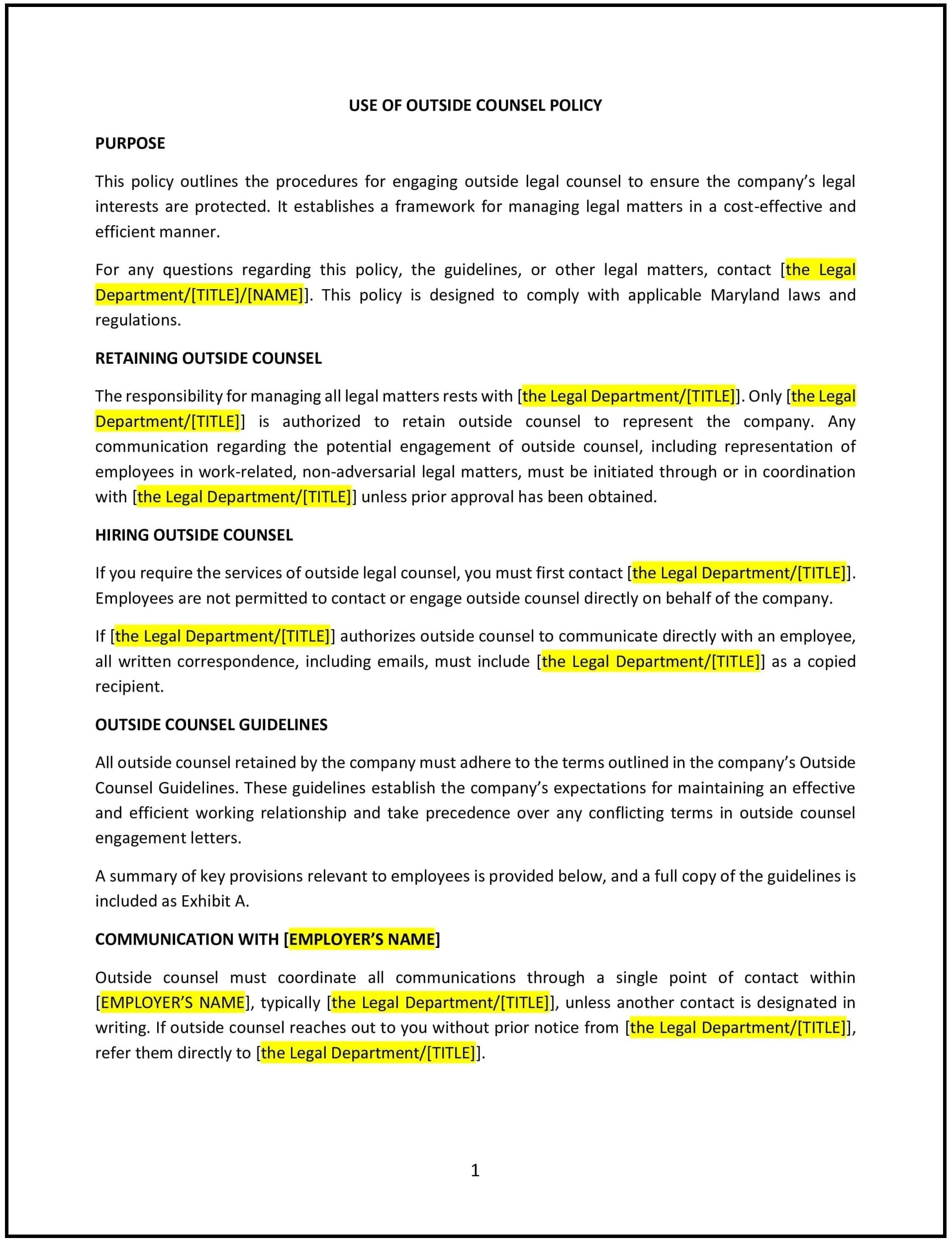Use of outside counsel policy (Maryland): Free template
Got contracts to review? While you're here for policies, let Cobrief make contract review effortless—start your free review now.

Customize this template for free
Use of outside counsel policy (Maryland)
This use of outside counsel policy is designed to help Maryland businesses establish clear guidelines for engaging and managing outside legal counsel. It outlines when and how external attorneys should be utilized, the process for selecting outside counsel, and expectations for cost management, communication, and performance.
By adopting this policy, Maryland businesses can effectively manage legal costs, ensure consistency in legal advice, and maintain a clear relationship with outside counsel.
How to use this use of outside counsel policy (Maryland)
- Define when outside counsel is necessary: Clearly outline circumstances under which outside counsel should be engaged, such as for specialized legal expertise, complex litigation, or situations where in-house counsel is unavailable or conflicted.
- Establish selection criteria: Set guidelines for selecting outside counsel, including qualifications, experience, and any specific expertise required for the matter at hand.
- Outline cost management procedures: Set expectations for budget limits, billing structures (hourly, flat fee, etc.), and approval processes for legal fees to ensure cost efficiency.
- Set communication protocols: Define how outside counsel should communicate with internal stakeholders, including regular updates, reporting, and direct contacts for timely responses.
- Address confidentiality and conflicts of interest: Ensure that outside counsel agrees to confidentiality terms and discloses any potential conflicts of interest that may affect their ability to represent the business effectively.
- Reflect Maryland-specific considerations: Include any state-specific legal requirements or practices that apply to the use of outside counsel, such as local bar rules or unique business practices.
Benefits of using this use of outside counsel policy (Maryland)
Implementing this policy provides Maryland businesses with several advantages:
- Controls legal costs: Establishes clear guidelines to manage outside counsel expenses and avoid unexpected or excessive legal fees.
- Enhances legal efficiency: Ensures that businesses select qualified and suitable outside counsel for specific legal matters, leading to more effective and timely legal outcomes.
- Promotes consistency: Provides a standardized process for engaging outside counsel, ensuring that decisions are aligned with business goals and legal requirements.
- Reduces risk: Mitigates the risk of conflicts of interest and ensures that outside counsel adheres to confidentiality agreements and ethical standards.
- Aligns with Maryland laws: Ensures that the business is aware of and adheres to Maryland-specific legal practices when engaging outside counsel.
Tips for using this use of outside counsel policy (Maryland)
- Communicate clearly: Ensure that both internal teams and outside counsel are aware of the policy and understand their roles and responsibilities.
- Regularly review costs: Monitor legal fees and performance to ensure that outside counsel is providing value and operating within budget constraints.
- Manage relationships effectively: Establish regular check-ins and performance reviews with outside counsel to maintain clear communication and address any issues promptly.
- Implement a vendor management approach: Treat outside counsel as a business partner and build long-term relationships based on performance, cost-effectiveness, and trust.
- Review the policy periodically: Update the policy as necessary to reflect changes in Maryland laws, legal practices, or business requirements.